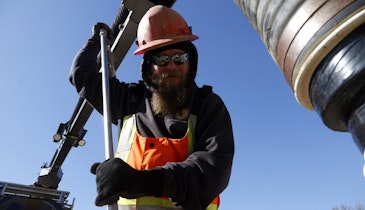First responders recently rescued a sewer repair worker who was stuck in concrete at an excavation site in Lamay, Missouri.
The worker had been trapped for about 30 minutes, firefighter Johnny Lewellen told KPLR News. “When we arrived, there was a construction worker doing a sewer repair with a partial collapse on the extrication site. He was pinned from the waist down and we had to dig him out with hand tools. There was not much room to move in there.”
After a half hour of digging, the rescuers were able to lift him out of the hole and place him on a stretcher for evaluation.
Authorities in Arizona are accusing an elected utility regulator of accepting bribes in the form of $31,000 in cash from a water company owner. The regulator also tried to get that owner to buy him a $350,000 piece of property, say investigators.
In return, the regulator, Gary Pierce, voted in favor of a rate increase and approved a rule letting the water company owner use ratepayer money for his income tax bill.
The allegations first surfaced two years after pierce left the regulatory body due to term limits. He and his wife, along with the water company owner and a lobbyist, have pleaded not guilty to charges.
State regulators in Wisconsin are asking Madison Water Utility about its $6 million deficit before approving the utility's rate-increase request. Depending on how the talks go, it could mean an even larger rate increase for water customers than was previously expected.
A Wisconsin Public Service Commission auditor pointed out that Madison Water Utility hadn’t mentioned its budget issues when it filed for the rate increase, but utility officials insist that they didn’t learn the extent of the deficit until the end of the fiscal year in April.
Scientists have detected traces of opioids in mussels near Seattle and Bremerton in Washington’s Puget Sound. Mussels from three of 18 sample locations tested positive for oxycodone that came via wastewater, according to the Puget Sound Institute at the University of Washington-Tacoma.
“What we eat and what we excrete goes into the Puget Sound,” biologist Jennifer Lanksbury told KIRO-7 News. “It’s telling me there’s a lot of people taking oxycodone in the Puget Sound area.”
While the opioids can’t be processed by mussels and don’t affect them directly, scientists say they could affect other fish species in Puget Sound.






